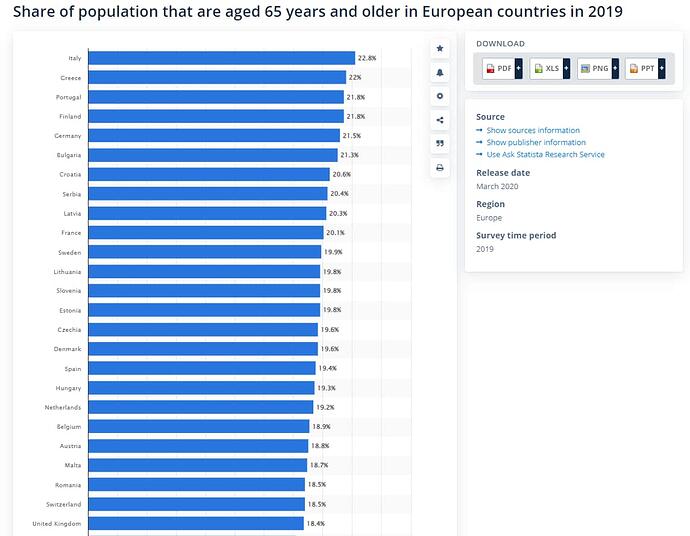Nicola Sturgeon has admitted it was a mistake.
@Omah , Imo, most of your answer above only confirms my
opinion that uk suffers from more oldies and people who’s lives
are allready precarious,than other countries have?
And therefore cannot be compared !
Donkeyman! 

PS. I have allready explained the reason for this in my earlier
post !
@Omah , BUT, UK is the only one with a NHS system !
Italy may have old people but they are not ,frail, most of the frail ones have allready pegged off !!
Donkeyman! 

@Donkeyman From my own experience, Italy does have an NHS of sorts. You pay upfront for treatment then reclaim the cost on your next annual tax declaration.
@Percy_Vere , Not quite the same is it Percy ?
If you didn’t have the cash what would you do?
Hence my remark that all the frail patients have pegged off!
Donkeyman! 

Didn’t say it was Donks, old fruit. If Italy had an exact same set up as us, the country’s health care would have gone out of the window decades ago.
During the Covid pandemic, Cambridge-based Chemical Intelligence, run by Robert Gros, won £162m of government contracts to provide personal protective equipment (PPE). Data obtained by the BBC shows at least a fifth of the equipment supplied was classified as “not fit for use”.
Chemical Intelligence said all the PPE it provided was fit for purpose.
The Department for Health and Social Care (DHSC) told the BBC it was in “a commercial dispute with this supplier” so could not comment further.
Chemical Intelligence was founded in 2012, and five years later successfully licensed an antimicrobial medical glove. According to public contract data, it was awarded three contracts from the DHSC in April and May 2020 totalling £162m to ship gowns and face-masks from China.
The company, then made up of two employees, said it was invited to supply PPE during the pandemic because of its proven track record. Companies House records show it went on to make an operating profit of more than £30m in the years ending August 31st in both 2020 and 2021.
Spreadsheets leaked to the Good Law Project and seen by the BBC suggest the DHSC ordered 20.5 million gowns from Chemical Intelligence at a total cost of £160m and spent an extra £1.98m on two million face masks. Further data obtained by the BBC showed that in January the department was holding 4.5 million gowns supplied by Chemical Intelligence that had been “subclassified as not fit for use”. “The value of this stock has been written down to £0 in the department’s accounts,” the Freedom of Information Act response added.
Of the remaining gowns supplied by Chemical Intelligence, the DHSC said in response to an FOIA request in March that 217,000 had been handed to NHS Trusts. This means that 1.06% of the 20.5 million gowns provided in 2020 had been used by April this year. The DHSC said the gowns had been released for NHS use - there is no suggestion that any are faulty.
In January 2022, Chemical Intelligence paid £7m in dividends and two months later paid dividends of £40m into a holding company, wholly owned by Robert Gros.
Mr Gros, 55, has since acquired office space on Hill Road in Cambridge and purchased a £3.95m house in Cambridgeshire.
There is no suggestion Chemical Intelligence Ltd broke any rules or acted improperly in any way.
However, questions remain over the DHSC’s handling of contracts for PPE and the use of public money to purchase equipment which has still not been released to NHS frontline services.
Although Mr Gros has, apparently, done nothing wrong in the eyes of the law, he made a lot of money for doing nothing except arranging a contract which failed, in some part, to meet NHS requirements.
However, after an unconnected legal challenge by the Good Law Project, a High Court judge ruled that Matt Hancock had acted unlawfully by handing out PPE contracts without publishing details in a timely way. A ruling released by the High Court stated: “There is now no dispute that, in a substantial number of cases, the secretary of state breached his legal obligation to publish Contract Award Notices (CANs) within 30 days of the award of contracts.”

